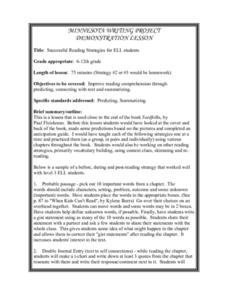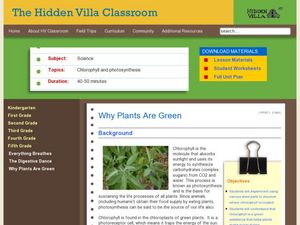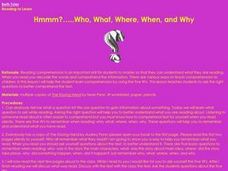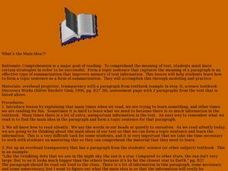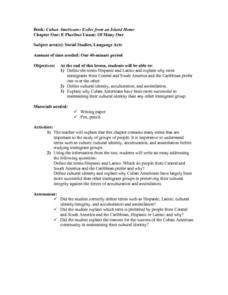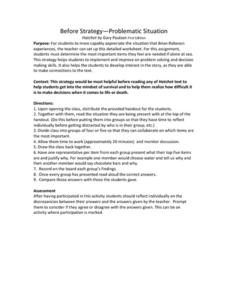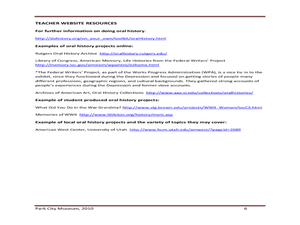Curated OER
The Importance of Liberal Arts
Learners analyze the importance of receiving a liberal arts education. In this liberal arts instructional activity, students read about the differences between vocational training and a liberal arts education.
Curated OER
Successful Reading Strategies for ELL Students
Students improve their reading comprehension through predicting, connecting with text and summarizing. Students should have already read the book Seedfolks and made predictions based upon what they had seen from the cover and pictures...
Curated OER
Why?
Students discuss the concept of asking questions while reading. They discuss the types of questions to ask that will improve their comprehension. Students read from a textbook and practice creating questions to ask themselves while...
Curated OER
Narrowing a Topic & The Importance of Audience
Help your young writers through the sometimes difficult process of beginning to write. Direct them through how to choose a topic and write to a specific audience. Great refining statements guide them to writing focused, clear essays.
Pearson Longman
Leap Year
Have you ever been asked to explain a leap year/leap day? Use this response to reading worksheet to support your scholars in finding out what it is, and its importance to our calendar. This resource is made up of eight questions...
Curated OER
Why is Roosevelt on the Dime?
Learners use a variety of reference resources to research the life of Franklin Roosevelt. From this research, they determine why his image was chosen to appear on the dime.
Curated OER
Why Plants Are Green
Students discover the properties of chlorophyll in plants. In this plant biology lesson, students conduct an experiment to find where the chlorophyll in the plant is located. Students are split into small groups and study plant parts....
Curated OER
Creative Problem Solving: Using the 5 W's (Who, What, Where, When, Why)
Third graders assimilate the use of the 5 W's (Who, What, Where, When, Why) when solving problems that are presented in literature and in real life situations. They use common fairy tales to solve problems that might arise at home or...
Curated OER
Using Is and Are
First graders discuss when to use "is" and "are" in a sentence. They practice using is and are correctly in sentences and practice writing sentences using "is" and "are" in their writing. Students complete a worksheet using is and are.
Curated OER
English - "What, Why, When, How, Where, Who?" - Framing Questions to Obtain Information
Students explore interviewing skills. In this interviewing skills lesson, students frame questions to obtain informative answers as they use what, why, when, how, where, and who questions.
Curated OER
Hmmm...Who, What, Where, When, and Why
Pupils practice reading comprehension by answering the 5 "W" questions. After reading "The Kissing Hand," they complete a class discussion addressing the questions who, what, when, where, and why. Students choose an appropriate,...
Curated OER
What is The Main Idea
Pupils will investigate why comprehension is a major goal of reading. To comprehend the meaning of text, students must know certain strategies in order to be successful. Form a topic sentence that captures the meaning of a paragraph is...
Curated OER
Literary Analysis - Young Goodman Brown
Why is literary analysis so important? Readers explore writing a literary analysis by reviewing literary elements such as character, metaphor, plot, setting, simile, personification, and style. They read "Young Goodman Brown" by...
Curated OER
Cuban Americans: Exiles from an Island Home
Middle schoolers define the terms Hispanic and Latino and explain why most immigrants from Central and South America and teh Caribbean prefer one over the other. They define cultural identity, acculturation, and assimilation. Students...
Curated OER
Lesson 3: Writing a News Story
Start a writing lesson by examining a news video that explains writing clearly, concisely, and correctly. Learners consider the importance of writing news properly to avoid breaking the law, then write their own weekend news stories.
Curated OER
Build Masters: Identifying Details
Find key details in books using this note card strategy. Each reader gets six cards with the classic who, what, where, when, why, and how detail prompts. After they read the book, they choose a card and locate a key detail answering the...
Smithsonian Institution
Mary Henry: Journal/Diary Writing
A great way to connect social studies with language arts, a resource on Mary Henry's historical diary reinforces the concepts of primary and secondary sources. It comes with an easy-to-understand lesson plan, as well as the reference...
Curated OER
Hatchet: Before Strategy- Problematic Situation
If you were stranded on a desert island, what items would be the most important to have with you? Decide whether you'd want a five gallon can of water, a radio, shark repellent, or any other item with an activity designed to prepare kids...
Curated OER
Sarah, Plain and Tall Study Guide
Patricia MacLachlan’s award-winning novel, Sarah, Plain and Tall, is the focus of a comprehensive study guide. For each chapter, readers answer fact-based and interpretative questions, define and use vocabulary words in a sentence, and...
Curated OER
Like It Or Not?
Write a review of the film adaptation of Holes. After viewing the film, your young reviewers make recommendations about viewing the film. Using details to support their opinions, they highlight the important parts of the movie without...
Curated OER
Star Reading
Learners of all ages discover the importance of reading fluently by viewing celebrities reading children books and telling about their personal paths to fluency. They participate in a fluency reading routine that connects them with a...
Roald Dahl
Matilda - The Reader of Books
The titular Matilda from Roald Dahl's famous novel adored books above all things. Discuss why it is important to read stories from across cultures and around the world using the first chapter from the ever-loved story Matilda.
Curated OER
Reintroduce: Main Idea
What would a main idea be without important details? Readers use a graphic organizer to record key details from an informational text (a fiction text would also work). Review main idea as a concept before beginning, asking scholars to...
Curated OER
Oral History: Park City Museum
Bring U.S. history to your language arts class with this lesson. Middle schoolers complete an interview for an oral history project, and discuss the importance of oral histories - and how they embellish written accounts. They write...



